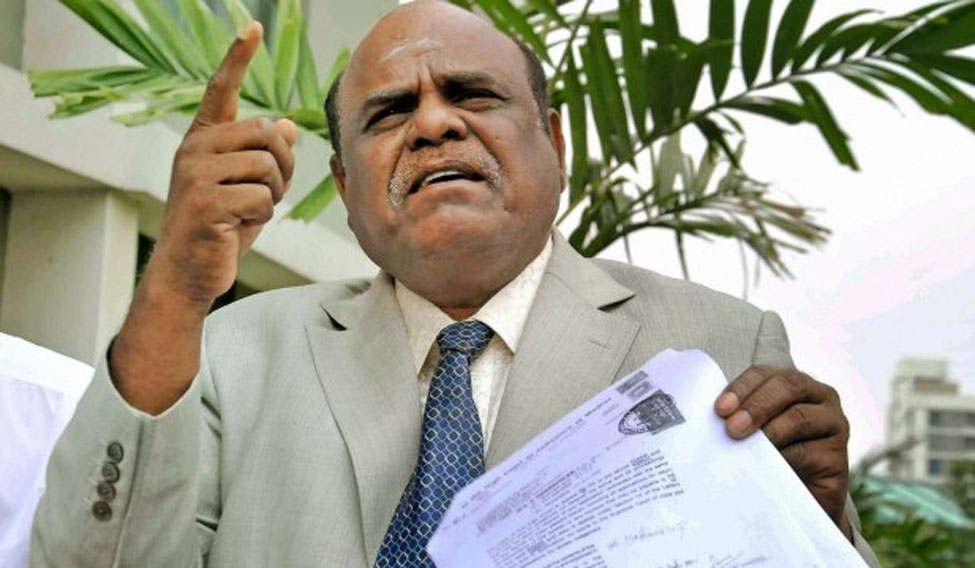Contempt laws, all over the world, has come from the idea of a Roman Catholic law. Centuries back it was used as an old law to prove authority of the church leaders in Rome.
If one would speak against the doctrine preached by Catholic church, it would amount to heresy. But punishment was not the church’s philosophy, it was reformation.
It is the idea to reform the mind of the corrupt source. The corrupt source is forced to understand that he or she made a mistake. That reform first comes from the remorsefulness of a person. So when a person starts feeling remorse, it would be fair for the church to forgive him.
An apology is therefore accepted as sign of remorsefulness and a person could be set free thereafter. Like many nations in the world, India has also taken the same spirit out of old church laws.
In the case of Justice Karnan, who refused to offer any kind of apology, such provision might work for him.
Asked about it, his legal counsel in Supreme Court, Mathews J. Nedumpara, told THE WEEK, “Yes there is a provision and we are not ruling that out in the case of my client.”
But will he offer any apology? Sources close to Justice Karnan told THE WEEK that he would not as he was stubborn and was out to fight a long battle. But life in jail changes many things for many people. Karnan's case is not different.
His case has been rare in the sense of many things. Karnan was convicted before the case was closed. Seven bench judges in an interim order ordered his six months judicial custody on May 8. Within days one of the judges, P.C. Ghose retired.
The case cannot be restarted unless the vacancy is filled up. Chief Justice of India, J.S. Khehar, will fill the gap once the court opens after vacation. But by the time, Karnan got arrested. At the same time his mercy petition is pending before the president of India.
President Pranab Mukherjee, as Mathews said, has referred the case to home ministry for opinion. But before he could take a final decision, the Election Commission of India notified presidential election. Mukherjee reportedly asked home ministry, to send the matter to new president of India for consideration who will take charge in mid July.
Leave aside judicial logjam, Justice (retired) Karnan also faced stumbling blocks while he retired. He was not present to sign the papers related to his pension and other retirement benefits. His counsel and legal team visited law minister and other government officials to pave way for it. But nothing could be done unless and until the man serving the nation is made available.
So for Karnan’s family and friends what needed most was to have him released on bail. And for that he would have to win the suspension of sentence from the same judges who convicted him. What is needed for that is a recorded apology. The next things would be to get a presidential intervention. But President of India so far has not interfered in the contempt of law case.
Karnan’s team is fighting the case as the man himself wanted to fight the judiciary. His legal team is finding loopholes in Supreme Court’s order asking Calcutta High Court to relieve him from all kind of judicial and administrative works. Before convicting him, Supreme Court had asked him to tender an apology. But Karnan then said as quoted by his legal team, “I am under severe mental stress because I have been removed from office. Only parliament can do that. Restore my official status and then I would consider offering apology.”
Mathews said, “Only Calcutta High Court chief justice, being the master of the roster, could prohibit a judge from having assignment. Supreme Court has no power in it. Constitution does not guarantee that High Court is inferior to Supreme Court.”
It was accepted fact that Karnan overstepped limit by issuing order against Supreme Court. But jurists are out to find fall in the “direct tussle that Supreme Court had invited Karnan to engage with”.
Karnan argued after his arrest that his administrative work were intervened in without his consent and suo-motu by Calcutta High Court chief justice.
“My complaint was not against Supreme Court, but was against some judges whom I found very corrupt. But how can Supreme Court step in to save them?” a question he asked even after his arrest.
He also said he was put to jail without being a proper trial.
“His presence was not secured before doling out punishment to him. He was not told what the charges were. If he was not appearing a warrant should have been issued against him to bring him before the court. Court ordered a bailable warrant in which justice Karnan met all the conditions and executed bonds with Rs 10,000 payment was handed over to him. But why his presence was not ensured and court did not wait for long?” asked Mathews.
He said court should have issued non-bailable warrant due to which Karnan would have been forced to appear before court as otherwise he would have been arrested.
His legal team would fight, once the bench sits, on the same line and would try to save Karnan six months of imprisonment.





